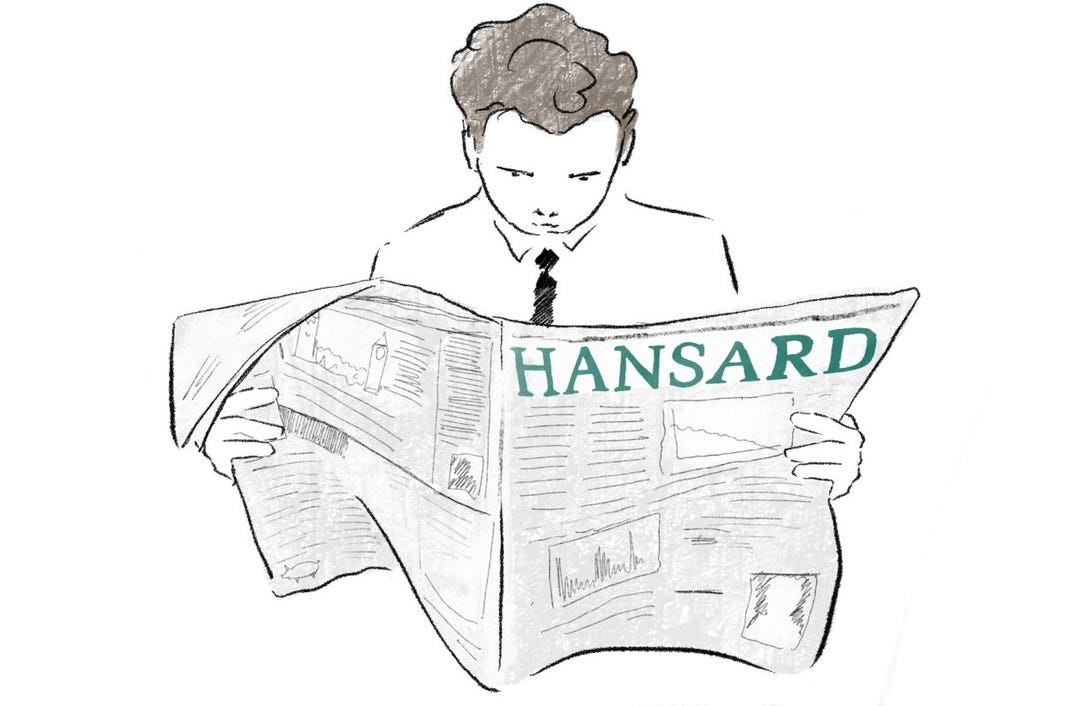Foreign Secretary on China, Britishvolt, Industrial Strategy, 兔年兴旺
A Beijing to Britain briefing
Hello and 兔年快樂
A number of world leaders, CEOs and business folk gathered in Davos this week for the World Economic Forum. From my perspective, the most useful content to emerge from this gathering tends to be the comments we get to hear from those outside the US-EU-China bubble. In the context of the UK’s Indo-Pacific tilt and understanding where Britain’s partners, allies and competitors stand, it should matter to British policymakers what these leaders are saying. As Anutin Charnvirakul, the Deputy Prime Minister and Minister of Public Health of Thailand summarised: “If you look geographically at the formation of ASEAN countries, we are the only region that connects the West with East. Nobody could pierce through the eastern hemisphere without passing through the ASEAN region.”
Yoon Suk Yeol, the President of the Republic of Korea, used his speech to criticise countries pursuing industrial policies that moved away from globalisation and into protectionism - like the United States and China and China. “Building up walls and intensifying protectionism cannot be the right answer”, he noted. “The most urgent task of our time is to strengthen the supply chain’s resilience based on reciprocal solidarity.” In interviews with the Financial Times and the Wall Street Journal, Philippine president Ferdinand Marcos Jr. emphasised a feeling widely expressed by countries throughout the region: don’t make us pick a side. Speaking to the former, Marcos described the rise in tensions between the US and China over Taiwan as “very, very worrisome for us”, but that when he raised his concern with President Xi Jinping of China, the reception was “very encouraging”. In comments to the Wall Street Journal, Marco told the American paper “[w]e don’t want to get trampled,” and that he fears others could “ignite something that is much larger and much worse than it is already now” in the South China Sea.
On the topic of Taiwan, Lai Ching-te took over as leader of the island’s ruling Democratic Progressive Party on Wednesday. Described by Nikkei as a front-runner to be the party’s Presidential candidate, he is a “fierce defender of Taiwan's self-governing status.” In comments delivered at his swearing-in, Lai said that “Taiwan is already an independent and sovereign nation, there is no need to further declare Taiwan independence." Given the recent Westminster focus on Taiwan following the invasion of Ukraine, it will be worth watching closely to see if any of the comments coming from actual Taiwanese officials cut through the SW1 bubble.
Finally, it’s perplexing to see how little mainstream discussion there is of industrial policy and the UK’s lack of it. The United States, China and the European Union continue to adopt increasingly protectionist policies, taking aim at sectors like semiconductors, AI and biotech that will govern the economic and foreign policy battles of the coming decades. Meanwhile, according to Bloomberg, the UK’s unpublished Semiconductor Strategy has been ready since last summer, provides the insight that the country is dependent on Taiwan for the technology, concludes that the supply of chips is an issue of major geopolitical and economic importance, and urges the Government to diversify and invest in R&D. As I’ve said before, it has been described to me by a senior government official as being something someone who read The Economist for three months could have created. A delayed strategy, which when published will already be out of date when compared to the actual legislation brought in by Britain’s allies and competitors, doesn’t really create a wider sense of confidence in the UK’s larger industrial policy ambitions.
On a happier note: 兔年大吉 from Foreign Secretary James Cleverly, UK Ambassador to China Caroline Wilson and her team, deputy representative of the British Office in Taiwan Tom Burn, and Beijing to Britain. 愿你的新年像兔子一样祥和美好!
— Sam Hogg, Editor
Order! Order!
Some of the more eye-catching questions and tweets from Westminster dwellers this week
Tom Tugendhat (Security Minister) tweeted “Jacinda Ardern’s China policy weakened the Five Eyes alliance @thetimes https://t.co/Lg9bkFn74w”
Gavin Williamson (Conservative) asked “the Secretary of State for Foreign, Commonwealth and Development Affairs, what recent assessment his Department has made of Chinese activity in Somalia.”
Catherine West (Labour Shadow Minister for Asia) asked “the Secretary of State for Foreign, Commonwealth and Development Affairs, what assessment he has made of the potential implications of Chinese investment in Nepalese infrastructure projects for regional (a) security and (b) stability.”
Politics
Government activities
Keeping up with the Cabinet
On Tuesday morning, Britain’s Foreign Secretary James Cleverly touched down in America for a multi-day visit to the United States and Canada. Pitched by the Government as a tour to “galvanise global action on Ukraine for 2023”, Cleverly discussed the UK’s ongoing efforts to accede to the Comprehensive and Progressive Agreement for Trans-Pacific Partnership (CPTPP) with his Canadian counterpart, and delivered a joint press conference with a US Secretary of State.
The visit also saw the Foreign Secretary deliver remarks on Russia and Ukraine at Centre for Strategic and International Studies on Britain’s foreign policy priorities. This formed the bulk of the back-and-forth Q&A, until towards the end of the session when Cleverly was asked what lessons China may be learning from the invasion. Like most of his British contemporaries, the Foreign Secretary was unable to answer the question, speaking in vague generalities “Well, look, it’s – I’m going to zoom out a bit, because, as I said, you know, a lot of people, a lot of countries, will be looking at how this plays out…we just need to be thoughtful about the message that we’re sending” and, when pressed to give detail, finishing with “Well, you’ll excuse me. My focus at the moment is on the – is on the kinetic, brutal, painful conflict that’s playing out in Ukraine.”
That afternoon, Cleverly gave a joint press conference alongside Secretary of State Antony Blinken. Among the talk of Russia and Ukraine, Blinken revealed that in recent days the “United Kingdom has denied export licenses to research laboratories funded by foreign defence companies and blocked the transfer of sensitive intellectual property.” [The Foreign Office did not return a request for clarification over what Blinken was referring to here.]
Cleverly then noted the pair “discussed China’s growing assertiveness on the world stage, which poses a systematic challenge to many of our values and interests, and we recognize the need to manage competition with China, including through diplomacy and engagement.” They ”spoke of the need to enhance, with our allies and friends, our respective economic security, and we also need to take a long view, strengthen our resilience, and reduce strategic dependencies”, but that the UK and USA could not “ignore China or the need to engage with it, given China’s significance on every issue in world affairs, ranging from economic stability to climate change.”
On the Indo-Pacific, Cleverly said, “Britain and America share a steadfast commitment to peace and security…and the AUKUS partnership – a decade-long project to provide a nuclear-powered, conventionally armed submarine capability to Australia – is only possible because of the unique bond of trust between us.”
Speaking of the Indo-Pacific, following the recent signing of the landmark UK-Japan Reciprocal Access Agreement in London, Minister for the Indo-Pacific Anne-Marie Trevelyan spent the week in Japan. The Minister said “Japan is one of our closest partners in Asia. From science and innovation to defence and digital, we are developing a modern, cutting-edge partnership that is rooted in our shared values. My visit has showcased the depth of that collaboration, with so many more opportunities for investment, research and talent to be shared between our two countries.” Good Government debrief here, snap of AMT in Japan here, and interview with local media here which discusses CPTPP.
On the other side of the world, Britain’s Business Secretary Grant Shapps appeared on a Davos panel on the future of industrial policy. His most interesting comments came in the shape of a rebuke of America’s Inflation Reduction Act. Shapps said “we are great global traders, and we want the world to be as open as possible…it’s very very important we don’t slip into protectionism, and that is where at the edges, the IRA in the US is dangerous because it could slip into protectionism.” The Business Secretary also delivered a speech pitching Britain as a “Scale-up” country.
Also at Davos: leader of the opposition Labour party, Keir Starmer. He used his speech to set out Labour’s plan for economic and green growth, which seems to have been received well by talking heads at the resort. Worth keeping an eye on the idea Labour has put forward about creating a “clean power alliance” of countries.






